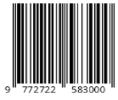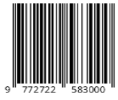Management of Sustainable Hemiramphus robustus Fishery in Boalemo District
Abstract
This study aims to examine the sustainability status of the julung-julung fish catch fisheries in Boalemo District based on the five aspects of ecology, economic, social, technological and ethical dimensions, and provide recommendations for strategies to support sustainability. This research was conducted in Boalemo District from March to August 2016. The method used in this research is survey method. As for the sustainability status analysis using Rapid Appraisal for Fisheries (RAPFISH), and for preparing strategy priorities using SWOT analysis (Strenght, Weaknesess, Opportunities, and Threath). The results showed that the status of sustainable fisheries cultivation of julung-julung dimension of ecology 80,63 (continuous), economics 35,80 (less sustainable), social 73,85 (sustainable enough), technology 55,51 (sustainable enough), and ethics 52.56 (fairly sustainable). When viewed in a multidimensional manner, the fishing activities of the julung-julung fish catch in Boalemo Regency are in sustainable condition with the value of IKP (Fishery Sustainability Index) 59.67. Strategies that need to be done in the management of capture fisheries are 1) Arrangement of fishing effort of the julung-julung, 2) Arrangement of catching season, 3) Protection of place to lay eggs, 4) Determination of fishing zone, 5) Related to capital, utilization of technology, and management assistance, 6) socialization of environmentally friendly fishing, 7) Improving fisherman's access to education, 8) integrated fishery management, 9) increasing fishermen's role in formulation of fishery policy, 10) And 11) Establish a group of independent fishery resource supervisor (POKWASMAN).
Keywords: Julung-Julung; sustainability; RAPFISH; SWOT; Boalemo
Keywords: Julung-Julung; sustainability; RAPFISH; SWOT; Boalemo
Full Text:
PDF (Bahasa Indonesia)DOI: https://doi.org/10.37905/.v7i2.4880
Refbacks
- There are currently no refbacks.
Copyright (c) 2020 Jurnal Nike








